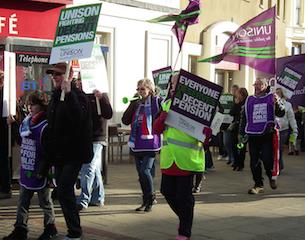
More than one million public sector employees are striking on 10 July in a dispute around pay, pensions and spending cuts.
Teachers, firefighters, librarians, transport workers and council staff are among those taking part from several trade unions, with rallies being held across the UK.
One of the biggest issues in the dispute is pay, after public sector salaries were frozen in 2010 and a 1% cap on pay rises was introduced in 2012.
The strike action includes:
- Members of the unions GMB, Unison and Unite, which represent hundreds of school teachers, local government and council staff, and workers who clean streets and empty household waste, who are striking over this year’s pay offer, which was confirmed at 1% for 2014-15 in the 2014 Budget.
- Members of the National Union of Teachers (NUT) who are striking in a dispute over pay, pensions and conditions of service.
- Members of the Fire Brigades Union (FBU) who are taking action in a row over pensions and retirement age.
- Members of the National Union of Rail, Maritime and Transport Workers (RMT) who work for Transport for London are also striking over pay and pensions.
- The Public and Commercial Services Union (PCS), which represent civil servants, passport office workers and other public sector employees, who are striking over pay, cuts to jobs, pensions and the privatisation of services.
Speaking at the Education Reform Summit in London, Michael Gove, secreatry of state for education, said: “Any change to the status quo is difficult. Of course, people can be more frightened of what might be lost than inspired by what might be gained.
“But for years, for decades, our status quo has simply not been good enough. We can’t, and we mustn’t, keep going backwards and failing the poorest above all.
“So to those striking today, to those walking out of classrooms to take to the streets, I urge them to reconsider.
“The unions, in the past, have claimed to ‘stand up for education’. Today, they’re standing up for their own pay and pensions.”
Frances O’Grady, general secretary of the Trades Union Congress, said: “Across the public sector workers are on strike today to say ’enough is enough’.
“Year after year, pay has failed to keep up with the living cost. Nearly half a million employees earn less than the living wage. But even as the economy starts to grow, ministers have told them that the pay cap will last until at least 2018.”
Dave Prentis, general secretary of Unison, added: “The government should look hard at the economic benefits of lifting the pay cap and ending the misery of low pay for public service workers.
“The continuing pay freeze is damaging staff morale and service quality across the public sector.”
Christine Blower, general secretary of the NUT, said: “Teachers regret having to take strike action. However, despite months in talks with government officials, the real issues of our dispute over pay, pensions and conditions of service have not been addressed.
“Performance-related pay is not suitable for schools, which work in a collaborative fashion.”
Matt Wrack, general secretary of the FBU, added: “The government must realise that firefighters cannot accept proposals that would have such devastating consequences for their futures, their families’ futures and the future of fire and rescue services.”



